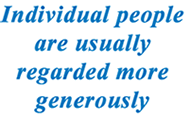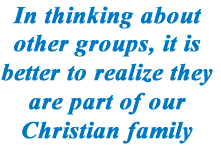How big?
continued from Page 1
As I reflect back on this incident with our family, I think in terms of the larger family to which we belong as children of God. And I wonder how clearly we realize we are part of a large family who are all followers of Jesus. My reflections include believing that we restrict the size of our family by the things we focus on that keep us divided and separate from each other. Think about it. Is our family really large, or is it rather small?
 A great deal of energy and time, in the churches with which I am familiar, has gone into critiquing the theological systems of other religious groups. In the process, we defend and justify our own doctrines and condemn those whose theological systems we see as flawed or inconsistent. In examining other Christian groups, our focus has mostly been on belief systems, written doctrines, practices, and theological mandates. Very little attention has been paid to the life-styles, the behavior, the goodness that flows from their lives. We study their rituals and beliefs and we mostly overlook their positive behaviors.
A great deal of energy and time, in the churches with which I am familiar, has gone into critiquing the theological systems of other religious groups. In the process, we defend and justify our own doctrines and condemn those whose theological systems we see as flawed or inconsistent. In examining other Christian groups, our focus has mostly been on belief systems, written doctrines, practices, and theological mandates. Very little attention has been paid to the life-styles, the behavior, the goodness that flows from their lives. We study their rituals and beliefs and we mostly overlook their positive behaviors.
Individual people are usually regarded more generously. We embrace and appreciate them even if they profess quirky belief systems. We accept them if their everyday living is healthy and moderately balanced. Irregular organized religious groups, on the other hand, are more likely rejected and held at a distance.
There is a related event in Jesus’ ministry. Isn’t Jesus’ attitude relevant to this topic? It may put a corrective spin on our tendencies. Look in The Gospel According to Mark. Chapter 9, verses 38 and 39, in the version called The Message: John spoke up, “Teacher, we saw a man using your name to expel demons and we stopped him because he wasn’t part of our group.” Jesus wasn’t pleased. “Don’t stop him. No one can use my name to do something good and powerful, and in the next breath cut me down. If he’s not an enemy, he’s an ally. Why, anyone by just giving you a cup of water in my name is on our side. Count on it that God will notice.”
 It is high time for us to change our attitudes. There is a better way to think about other groups, such as the Mormons. To start with, we should realize they are part of our Christian family—the Spirit of Jesus is living and active in them, too.
It is high time for us to change our attitudes. There is a better way to think about other groups, such as the Mormons. To start with, we should realize they are part of our Christian family—the Spirit of Jesus is living and active in them, too.
Certainly, the larger content of one’s belief is important. It is good that there is preaching and teaching that endeavors to clarify and declare what the Word really appears to be saying. But the individual ways we understand and perceive God’s teaching and promises may not be as important as our behavior. St. John says this when he declares, “…let us not love with words…but with actions.” I John 3:18.
This is given added weight when John says, “Everyone who loves has been born of God and knows God.” I John 4:7. Therefore, theological systems that we find puzzling, while disturbing our thinking, may still percolate loving kindness and spiritually admirable living. That may be the more important, crucial test.
Another example is the Catholic Church. It has long stood at a distance for many Protestants. It is so large, so diverse, and so ancient in its traditions that generalizations are hard to make. Catholics and Protestants feel different from each other. Invariably, when I ask someone who happens to be a Catholic, “Are you a Christian?” they reply, “No, I am Catholic.” Of course that bothers me, and I always say strongly, with a smile, “That’s Christian! We are both Christians!”
 That separation deeply troubles me. I have had friends who were Catholic Priests, and students who were Sisters. I love and appreciate them all. We are all part of the same family and we are all God’s children. We are working toward the same purposes of “building the Kingdom” and making the world a better place. Personally, I am thankful for Notre Dame University, Catholic colleges, and, right down the street, St John Bosco High School. I am grateful for every corner where a Catholic church stands, and I am endeavoring to consciously love them all. My heart is warmed when I see a Crucifix around a woman’s neck. The world is a much better place because of the “Original Church” from which we all have come. The details of how we choose to worship are far down the list below the importance of spreading Jesus’ love. Too often, we are bogged down in our differences, instead of rejoicing in our unity.
That separation deeply troubles me. I have had friends who were Catholic Priests, and students who were Sisters. I love and appreciate them all. We are all part of the same family and we are all God’s children. We are working toward the same purposes of “building the Kingdom” and making the world a better place. Personally, I am thankful for Notre Dame University, Catholic colleges, and, right down the street, St John Bosco High School. I am grateful for every corner where a Catholic church stands, and I am endeavoring to consciously love them all. My heart is warmed when I see a Crucifix around a woman’s neck. The world is a much better place because of the “Original Church” from which we all have come. The details of how we choose to worship are far down the list below the importance of spreading Jesus’ love. Too often, we are bogged down in our differences, instead of rejoicing in our unity.
The Seventh Day Adventist Church can serve as yet another example. We ‘traditional’ Christians seldom regard these people as our kin-folk, partners, and spiritual brothers and sisters. Their different theological system sets them apart from other Protestant groups and they are usually regarded negatively. They are different. Not only do they regard Saturday as the Sabbath, but they eat no meat, and drink no alcohol or caffeine. That sets them apart. Beyond that, they are committed to education and health-care systems and they are known by United States Health Care experts to be the healthiest of all of us. They are outstanding citizens of this world. I thank God for the Adventists regularly. They, like the Mormons and Catholics, are strongly contributing to the goodness of our society.
We felt it keenly at that gas station out west in the pleasant thoughtfulness of the clerks. But it is much bigger than that. Our world, near and far, is a much better place because of the love of Jesus that is alive and active in the hearts and minds of these groups we have mentioned, and other groups or denominations that may come to mind. They may have doctrines and practices we do not understand, or agree with, but the love of Jesus guides and influences their lives.
 In conclusion, here is my suggestion and my plea: Let us recognize these brothers and sisters as partners. With them, we are living, expressing, and spreading the love of Jesus in this world. Let’s change our spectacles and see these people as “the light of the world and the salt of the earth” who are serving right along with us and other followers of Jesus. We must take down the walls and fences, embrace them, and give thanks for their convictions and the goodness they add to our world.
In conclusion, here is my suggestion and my plea: Let us recognize these brothers and sisters as partners. With them, we are living, expressing, and spreading the love of Jesus in this world. Let’s change our spectacles and see these people as “the light of the world and the salt of the earth” who are serving right along with us and other followers of Jesus. We must take down the walls and fences, embrace them, and give thanks for their convictions and the goodness they add to our world.
Here is where our Care and Kindness campaign gets very big. There may be an opportunity now and then for heartwarming friendliness and spirit-lifting words of admiration and appreciation—as well as intentional acts of kindness—towards Christian groups that are a bit different from us. Let us not keep our love mostly at a distance. Instead, we can wrap our arms around them with soft thoughts, thinking of them in positive ways as our brothers and sisters, who are just like us. Let us not have a ‘small’ family, kept small by suspicions about people who have different belief systems. Let’s love and embrace them as part of our ‘large’ family.